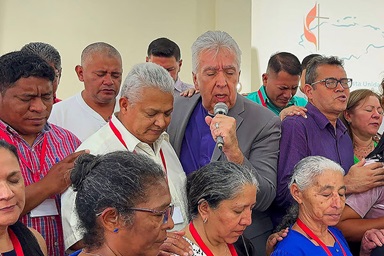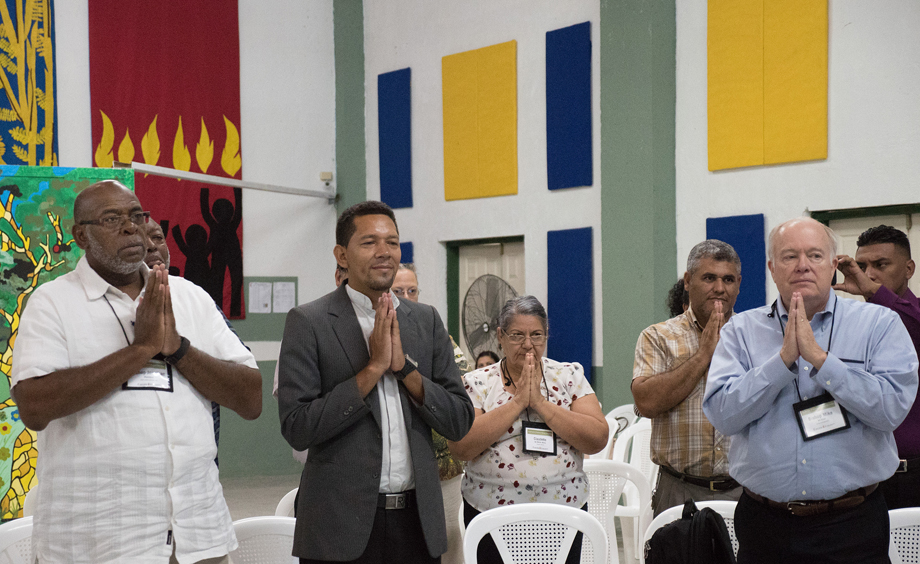
(From left) Bishop Jonathan Holston, the Rev. Carlos Cornejo, Claudete Mora, the Rev. Luis Soto and Bishop Mike McKee use body movement to pray the Lord’s Prayer as part of a devotion given by Bishop Cynthia Moore-Koikoi, at Cristo Resucitado, Ciudad España, Honduras.
Story and photos by Kathy L. Gilbert
Aug. 29, 2017 | TEGUCIGALPA, Honduras (UMNS)
The Rev. Héctor Mauricio Rodríguez Lainez, pastor at Aposento Alto United Methodist in Fuerzas Unidas, Honduras, often goes walking around his dangerous neighborhood. If he sees young girls and boys, he stops and prays with them.
Prayers are especially needed in Fuerzas Unidas, a marginalized 11-block neighborhood controlled by gangs or maras, who target young girls for sex and boys to sell drugs.
“If someone refuses to join the maras, they are given 48 hours to get out of the country or they will be killed. But really, they usually don’t get 48 hours,” Rodríguez said.
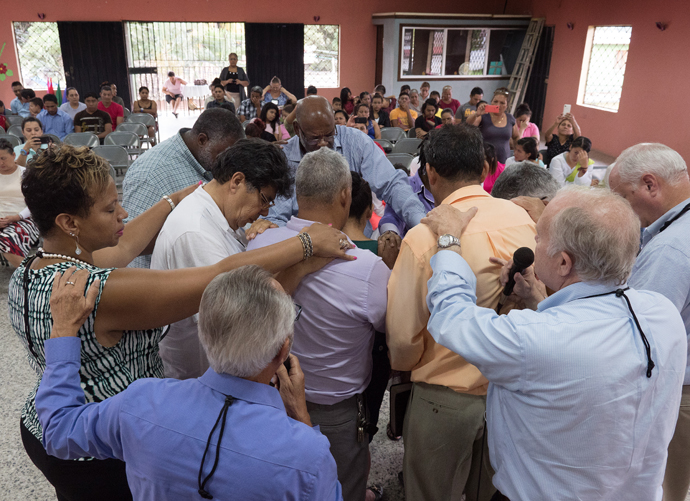
United Methodist bishops from the U.S. pray with pastors at Fuente de Luz United Methodist Church, Danlí, Honduras.
A pastor from a Guatemalan church near the border of Mexico said he sees a constant flow of young people trying to escape violence, hoping to make it to the U.S. He is pastor of Arca de Noé (Noah’s Ark) Methodist Church at Caserío Los Ciprianos, La Reforma, San Marcos, near the border of Mexico in Guatemala.
The pastor, who did not want his name used, said most of the migrants are youth ages 16 to 18 and young mothers with small children who are leaving because they have received death threats from gangs. The women of his church make and sell tamales so they can give money to the migrants.
“We try to warn them but there is no convincing them to go back,” he said. “One of the first things the bad guys do is force them to give up a family member’s telephone number. They call and tell families they will kill their son or daughter unless they pay a ransom.”
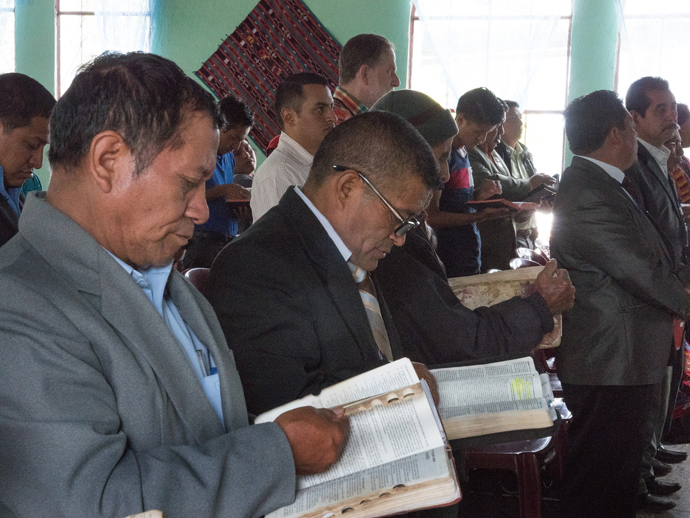
Pastors from Patuluc 1 and members of Iglesia Nacional Methodista Fuente De Vida, Guatemala, participate in worship service on July 24.
Honduras and Guatemala are two of the most violent places in the world. Tens of thousands of people, many of them unaccompanied minors, flee across borders to escape death, rape and extortion at the hands of the maras.
A small group of United Methodist bishops from the United States, along with staff from the Board of Global Ministries and United Methodist Communications, visited United Methodist churches in Honduras and Evangelical National Primitive Methodist churches in Guatemala, July 19-26.
The mission education journey immersed participants in the work of the church in the two Central America countries.
Watch Video
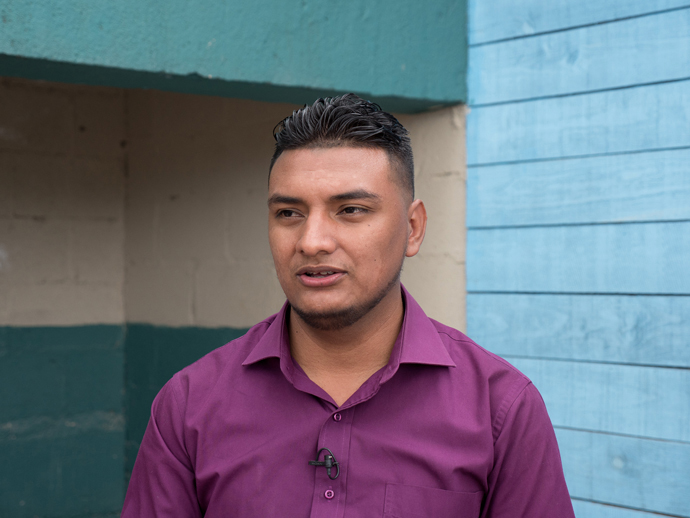
The Rev. Héctor Mauricio Rodríguez Lainez, pastor at Aposento Alto United Methodist in Fuerzas Unidas, Honduras, often stops and prays with young girls and boys in his community who are vulnerable to violence. He describes the challenges in this interview.
The United Methodist Mission in Honduras was started by the Board of Global Ministries in 1997 and is the only United Methodist church in Latin America. The church started as small groups in homes and has grown to 19 churches.
Rodríguez, 23, is one of the pastors serving in Tegucigalpa, Honduras. He came to speak to the U.S. group about ministry in his community. His congregation of 230 is mostly children and young people.
“The church is trying to attract gang members’ families,” he said. “Most of the kids who go to our church are sons (and daughters) of gang members.”
Rodríguez said the gangs are always watching who comes in and out of the neighborhood. Residents are forced to drive with their windows rolled down so they can be quickly identified.
“If they can’t identify you, they shoot you,” he said, shrugging his shoulders.
One of the gang members called out to him one day, calling him pastor.
“I was shocked he knew I was a pastor. He knew my schedule. He asked me if I had been robbed and said he could offer me protection.
“I asked him if he wanted me to pray for him. He looked around and then said, ‘You have five seconds to pray for me.’ So I just said, ‘God be with you and amen.’ ”
On another day while Rodríguez was praying with a group of people on the street, a young single mother started crying. She said she had been raped by 10 or more gang members — she said she lost count after 10.
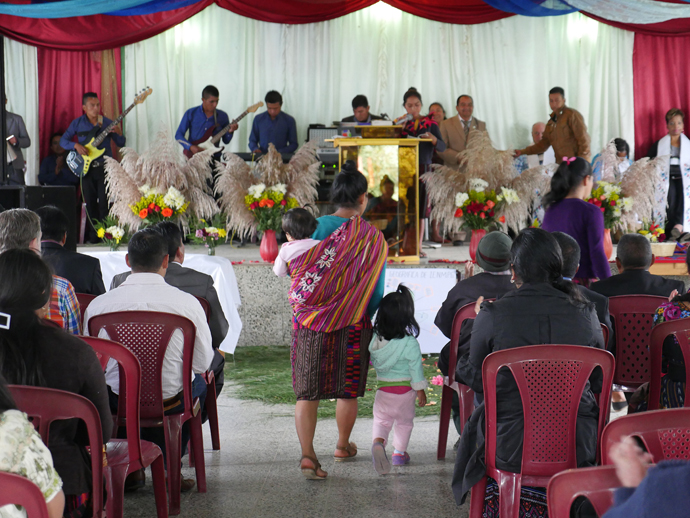
An usher with her two small children prepares to take an offering at Iglesia Nacional Methodista Fuente De Vida, Guatemala.
“She said she did not know who the father of her child is. I asked her to come to church and she said she felt too dirty,” he said. Many in the neighborhood shunned her.
“We have a special motto in our church, we say this is your house, this is your home, no matter what. We embraced her, helped with her child and in this way showed the community she was the same as anyone else,” he said.
Tears fill his eyes as he talks about his community.
“I ask myself, what is church doing here in such a lost and hidden place?”
Smiling, the young pastor then answers his own question.
“Just like Jesus Christ was hanged when he was sharing with people, I’m trying to help especially gang members. They are men like all the rest of us. They relate to me because I am young.”
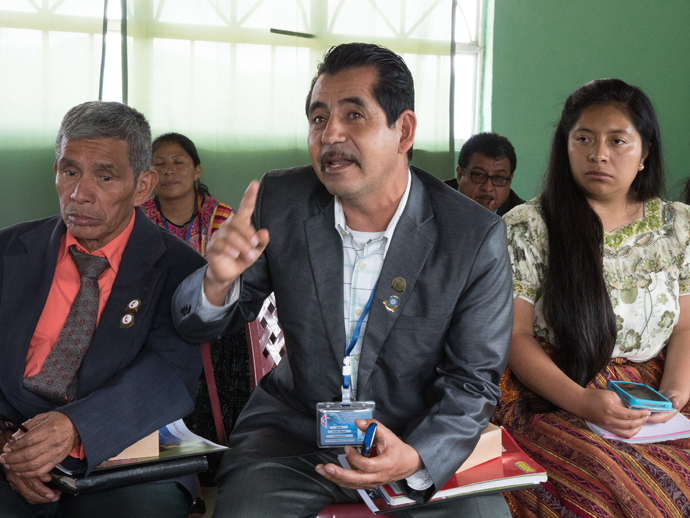
(From left, first row) The Rev. Ingrid Cac, Rev. Alejo Avila, and Ingrid Tixal, gathered at Iglesia Nacional Methodista Fuente De Vida, Guatemala, to speak to U.S. United Methodist bishops and church leaders about their ministry in Guatemala.
The meeting of Honduras church leaders was at Cristo Resucitado (Christ Has Risen) United Methodist Church in Ciudad Espaῆa on July 20. The church has a clinic and school — Juan Wesley — which has about 430 students enrolled.
The building was built with financial and spiritual support from the Church of the Resurrection in Leawood, Kansas, and the Board of Global Ministries in Atlanta.
“For two decades, Honduras has been a mission initiative of Global Ministries, developing along a pattern that could eventually lead to annual conference or district status, or might lead to an autonomous church. Such determination would eventually be made by the church in Honduras,” said Thomas Kemper, top executive of Global Ministries.
Kemper said the National Evangelical Primitive Methodist Church of Guatemala is a different kind of mission partner.
Special report: Honduras and Guatemala 2017
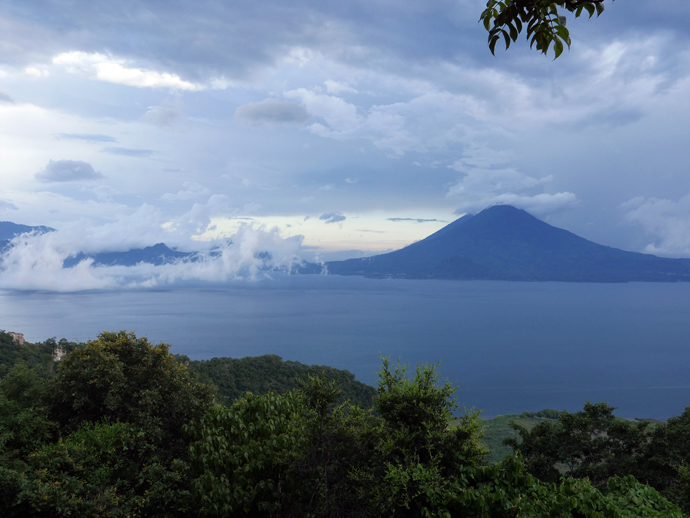
The second story in United Methodist News Service's series on Honduras and Guatemala focuses on Evangelica Nacional Metodista Primitiva de Guatemala church.
A Global Migration Sunday Offering will be taken in United Methodist churches on Dec. 3, the first Sunday of Advent. The offering will be used to directly aid migrants and refugees. Thomas Kemper, top executive of the United Methodist Board of Global Ministries, told pastors in Honduras and Guatemala that the world will be praying with them on that day.
“It is not part of our United Methodist Church structure but is part of our family of mission, as it has been since 1976 when we provided humanitarian aid and relief teams to help the country recover from a devastating earthquake.”
James Perdue, a Global Ministries missionary for migration in Central America and Mexico, presented an overview of the reasons people leave their homes and the problems they encounter.
He said one out of five Hondurans live on less than $1.90 a day and only 13 percent of youth complete secondary education.
Worldwide, one in seven people is a migrant, he said. “Globally, over 1 billion people are migrants within their own country or internationally.”
Desperate families are sending their children on long, dangerous trips across borders, he said.
"Think about it. What wouldn't you do to save your child?"
Perdue said United Methodist Global Ministries values four basic rights of all migrants: their right to stay; their right to safe and secure passage when they must migrate; their right to be welcomed and secure in countries where they arrive; their right to a welcome home and support in reinserting themselves when they are deported.
“A key piece of international migration law — nonrefoulement — is the understanding that if someone is running from danger, no country has the right to send them back to it,” Perdue said. “Rich countries do not have the right to send children home to die.”
The trip to Central America was a joint effort of the United Methodist Council of Bishops and the Board of Global Ministries. Leading the delegation were South Carolina Area Bishop Jonathan Holston, who is chair of the Leadership Table for the Council of Bishops, Kemper and Bishop Elias Galvan, Honduras Mission Initiative.
Bishops Cynthia Moore-Koikoi, Western Pennsylvania; Tracy S. Malone, East Ohio; Frank Beard, Illinois Great Rivers; David Graves, Alabama-West Florida and Michael McKee, North Texas Conference, were members of the delegation. The five are new or recently elected bishops.
“Central America, given its proximity to the U.S., is a popular region for Volunteers in Mission and mission partnerships and covenants,” Kemper said.
“We wanted the bishops to see how we United Methodists connect in mission in different ways in different locations — how we take account of various social and cultural contexts and how we go about initiating and maintaining mission relationships.”
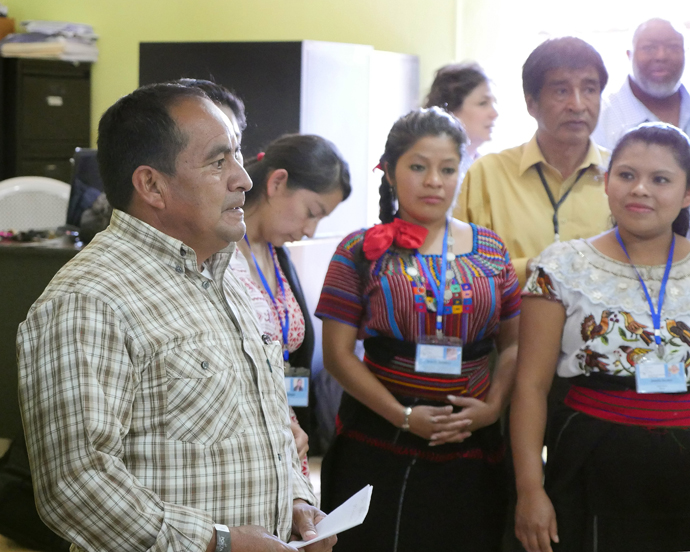
The Rev. Juan Ixtan Calgua, president of the Evangelical National Methodist Primitive Church of Guatemala, visits with other church leaders at the Organizacion para el Desarrollo Indigene Maya health clinic.
Perdue said “it was both sobering and inspiring” to hear from the Honduran and Guatemalan pastors who admitted anxiety at leaving their families alone and unprotected to meet with the U.S. group.
One of the pastors of the National Evangelical Primitive Methodist Church spoke of the power of prayer in combatting the violence. He received a threatening letter from a gang asking for an amount of money he could never afford, with a deadline and a threat: pay up or your wife and children will be raped and killed. He called his church members together to pray.
He did not realize it, but among the people praying were the parents of the gang member who had threatened him. The mother asked for special prayers for her children and both parents accepted Jesus that day, he said.
The day of the deadline came and went and he never heard from the gang again.
In story after story, all the pastors spoke of the power of prayer.
“There was a young boy, a member of the church, who was threatened. We came together and started praying and crying. To this day, the kid is still alive. It is like they forgot him,” Rodríguez said.
“I believe God is the only one who can help.”
Gilbert is a multimedia reporter for United Methodist News Service. Contact her at 615-742-5470 or newsdesk@umcom.org. To read more United Methodist news, subscribe to the free Daily or Weekly Digests.
Like what you're reading? Support the ministry of UM News! Your support ensures the latest denominational news, dynamic stories and informative articles will continue to connect our global community. Make a tax-deductible donation at ResourceUMC.org/GiveUMCom.


